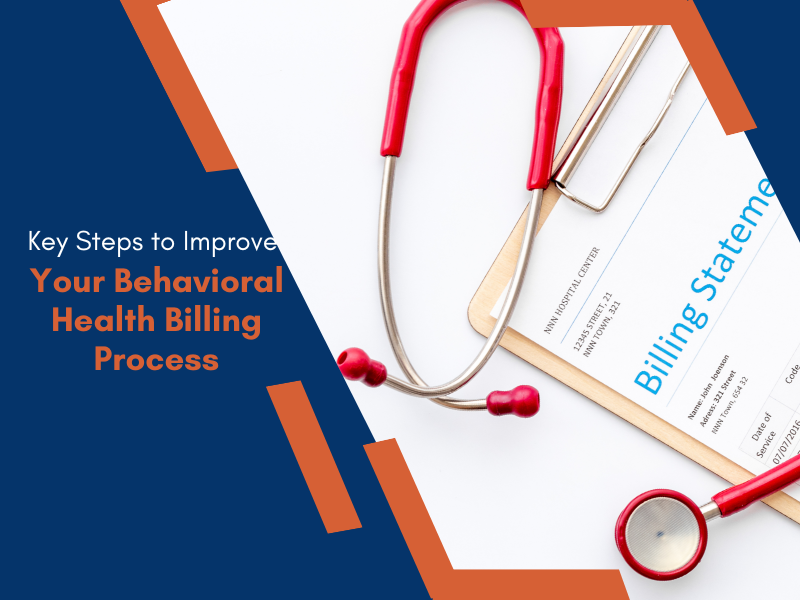The behavioral health billing process is often complex and fraught with challenges, from managing intricate documentation to ensuring compliance with ever-changing regulations. For behavioral health providers, an efficient billing system is crucial for maximizing revenue and streamlining operations. This blog outlines the key steps to improve your behavioral health billing process, helping you navigate this intricate landscape with ease.
1. Understand Behavioral Health Billing Regulations
Behavioral health billing is governed by specific rules that differ from other medical specialties. Familiarize yourself with these regulations, including HIPAA guidelines, payer-specific requirements, and local laws. Behavioral health often involves services like therapy, counseling, and psychiatric evaluations, which have unique billing codes and modifiers.
By staying updated on these rules, you reduce the risk of claim denials. Regular training sessions for staff can ensure everyone involved in the billing process is aligned with the latest regulations.
2. Utilize Accurate Documentation
Comprehensive and accurate documentation is the backbone of behavioral health billing. Ensure that therapists, counselors, and other practitioners record detailed notes about each session. This documentation should include:
- Session duration
- Type of service provided (e.g., therapy, evaluation)
- Diagnosis and treatment plans
Accurate documentation not only supports your claims but also protects you in case of audits. Implementing an Electronic Health Records (EHR) system can streamline this process by organizing records efficiently and reducing manual errors.
3. Master Behavioral Health Coding
Behavioral health billing requires a strong grasp of medical coding, particularly the use of CPT (Current Procedural Terminology) and ICD-10 (International Classification of Diseases) codes. Common behavioral health codes include those for individual psychotherapy, group therapy, and substance abuse counseling.
To avoid coding errors:
- Regularly update your knowledge of codes and modifiers.
- Cross-check codes with services provided.
- Leverage coding software to enhance accuracy.
Errors in coding can lead to claim denials or underpayments, making it critical to get this step right.
4. Verify Patient Insurance Eligibility
One of the most common causes of claim denials in behavioral health billing is unverified insurance coverage. To prevent this:
- Verify patient eligibility before every appointment.
- Check the scope of behavioral health services covered under their plan.
- Confirm co-pays, deductibles, and out-of-pocket costs.
Implementing real-time insurance verification systems can help streamline this process, ensuring that services are billed correctly from the outset.
5. Streamline Claims Submission
Timely and accurate claims submission is a cornerstone of successful behavioral health billing. Follow these best practices:
- Submit claims promptly: Delays in submission can result in missed deadlines and lost revenue.
- Use clean claims: Double-check for errors before submission to increase first-pass acceptance rates.
- Leverage technology: Use billing software that automates claim generation and submission, reducing manual intervention.
Automated claims processing not only saves time but also improves the overall efficiency of your billing cycle.
6. Proactively Manage Denials and Rejections
Even with the most meticulous process, claim denials are inevitable. What matters is how you handle them. Create a robust denial management system to:
- Identify the root cause of denials.
- Rectify errors and resubmit claims promptly.
- Track patterns to address recurring issues.
By maintaining a denial log, you can analyze trends and implement preventive measures to reduce future denials.
7. Monitor Behavioral Health Billing Metrics
Key performance indicators (KPIs) provide valuable insights into your billing process. Regularly monitor metrics like:
- Claim acceptance rates
- Days in Accounts Receivable (AR)
- Denial rates
- Payment turnaround time
Tracking these metrics allows you to identify inefficiencies and make data-driven improvements. Investing in reporting tools can simplify the tracking and analysis of these KPIs.
8. Enhance Staff Training and Communication
A well-trained billing team is essential for improving your behavioral health billing process. Provide regular training sessions to ensure they are updated on:
- The latest coding changes.
- Insurance payer requirements.
- Regulatory updates.
Fostering open communication among billing staff, providers, and administrators can further enhance coordination, ensuring seamless operations.
9. Adopt Advanced Behavioral Health Billing Software
Behavioral health billing software can significantly streamline operations. Look for solutions that offer:
- Integrated EHR and billing systems
- Insurance verification tools
- Real-time reporting and analytics
Such software not only minimizes errors but also reduces the administrative burden, allowing you to focus more on patient care.
10. Partner with a Professional Behavioral Health Billing Service
Outsourcing your behavioral health billing process to experts can be a game-changer. Professional billing companies have the experience and tools to manage the complexities of behavioral health billing, ensuring:
- Higher claim acceptance rates.
- Faster payment cycles.
- Compliance with all regulations.
Partnering with a reliable billing service allows you to focus on your core mission of delivering quality care to patients.
Why Improving Behavioral Health Billing is Essential
Improving your behavioral health billing process is not just about maximizing revenue—it also enhances patient satisfaction by minimizing billing errors and disputes. A streamlined billing system ensures that your practice operates efficiently, freeing up valuable resources to invest in patient care.
Choose Apaana Healthcare for Seamless Behavioral Health Billing
Navigating the complexities of behavioral health billing requires expertise and a robust approach. At Apaana Healthcare, we drive operational excellence with global healthcare management solutions tailored to your needs.
Our specialized services include:
- Member enrollment and eligibility verification.
- Claims administration to ensure timely reimbursements.
- Comprehensive medical billing and coding expertise.
- Provider engagement for seamless collaboration.
By partnering with us, you can transform your billing operations into a cost-effective and efficient system, enabling you to focus on delivering exceptional care. Contact Apaana Healthcare today to learn how we can optimize your behavioral health billing process!
Conclusion
Improving your behavioral health billing process is a continuous journey that requires attention to detail, the adoption of technology, and proactive management. By implementing these steps, you can overcome common challenges, streamline operations, and secure the financial stability of your practice. And when you need expert support, Apaana Healthcare is here to provide comprehensive solutions tailored to your needs.behavioral health billing





